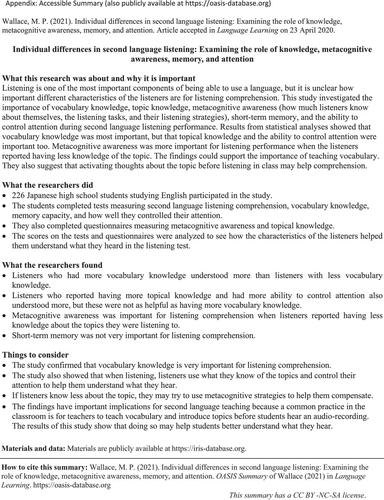当前位置:
X-MOL 学术
›
Lang. Learn.
›
论文详情
Our official English website, www.x-mol.net, welcomes your
feedback! (Note: you will need to create a separate account there.)
Individual Differences in Second Language Listening: Examining the Role of Knowledge, Metacognitive Awareness, Memory, and Attention
Language Learning ( IF 3.5 ) Pub Date : 2020-07-08 , DOI: 10.1111/lang.12424 Matthew P. Wallace 1
Language Learning ( IF 3.5 ) Pub Date : 2020-07-08 , DOI: 10.1111/lang.12424 Matthew P. Wallace 1
Affiliation

|
The aim of this study was to examine the direct and indirect effects of domain-specific knowledge (vocabulary knowledge and topical knowledge) and domain-general cognitive abilities (metacognitive awareness, memory, and attentional control) on second language listening comprehension. Data were collected from 226 Japanese senior high school EFL students. Data sources included a practice version of the TOEFL Junior Standard test, the Listening Vocabulary Levels Test, the Metacognitive Awareness Listening Questionnaire, memory recall tests, attentional control tests, and a study-generated questionnaire measuring topical knowledge. Scores from these instruments were examined using structural equation modeling. The results showed that vocabulary knowledge had the strongest total effect on listening performance. Topical knowledge and attentional control also had direct effects. Only metacognitive awareness had an indirect effect on listening comprehension through topical knowledge. The findings indicate that differences in domain-specific knowledge, particularly vocabulary knowledge, are the most important for predicting listening comprehension.
中文翻译:

第二语言听力中的个体差异:检查知识、元认知意识、记忆力和注意力的作用
本研究的目的是检验特定领域知识(词汇知识和主题知识)和领域一般认知能力(元认知意识、记忆和注意力控制)对第二语言听力理解的直接和间接影响。数据来自 226 名日本高中 EFL 学生。数据来源包括 TOEFL Junior Standard 测试的练习版本、听力词汇水平测试、元认知意识听力问卷、记忆回忆测试、注意力控制测试和研究生成的测量主题知识的问卷。使用结构方程模型检查这些仪器的分数。结果表明,词汇知识对听力表现的总体影响最强。主题知识和注意力控制也有直接影响。只有元认知意识通过主题知识对听力理解产生间接影响。研究结果表明,特定领域知识的差异,尤其是词汇知识,对于预测听力理解最重要。
更新日期:2020-07-08
中文翻译:

第二语言听力中的个体差异:检查知识、元认知意识、记忆力和注意力的作用
本研究的目的是检验特定领域知识(词汇知识和主题知识)和领域一般认知能力(元认知意识、记忆和注意力控制)对第二语言听力理解的直接和间接影响。数据来自 226 名日本高中 EFL 学生。数据来源包括 TOEFL Junior Standard 测试的练习版本、听力词汇水平测试、元认知意识听力问卷、记忆回忆测试、注意力控制测试和研究生成的测量主题知识的问卷。使用结构方程模型检查这些仪器的分数。结果表明,词汇知识对听力表现的总体影响最强。主题知识和注意力控制也有直接影响。只有元认知意识通过主题知识对听力理解产生间接影响。研究结果表明,特定领域知识的差异,尤其是词汇知识,对于预测听力理解最重要。











































 京公网安备 11010802027423号
京公网安备 11010802027423号